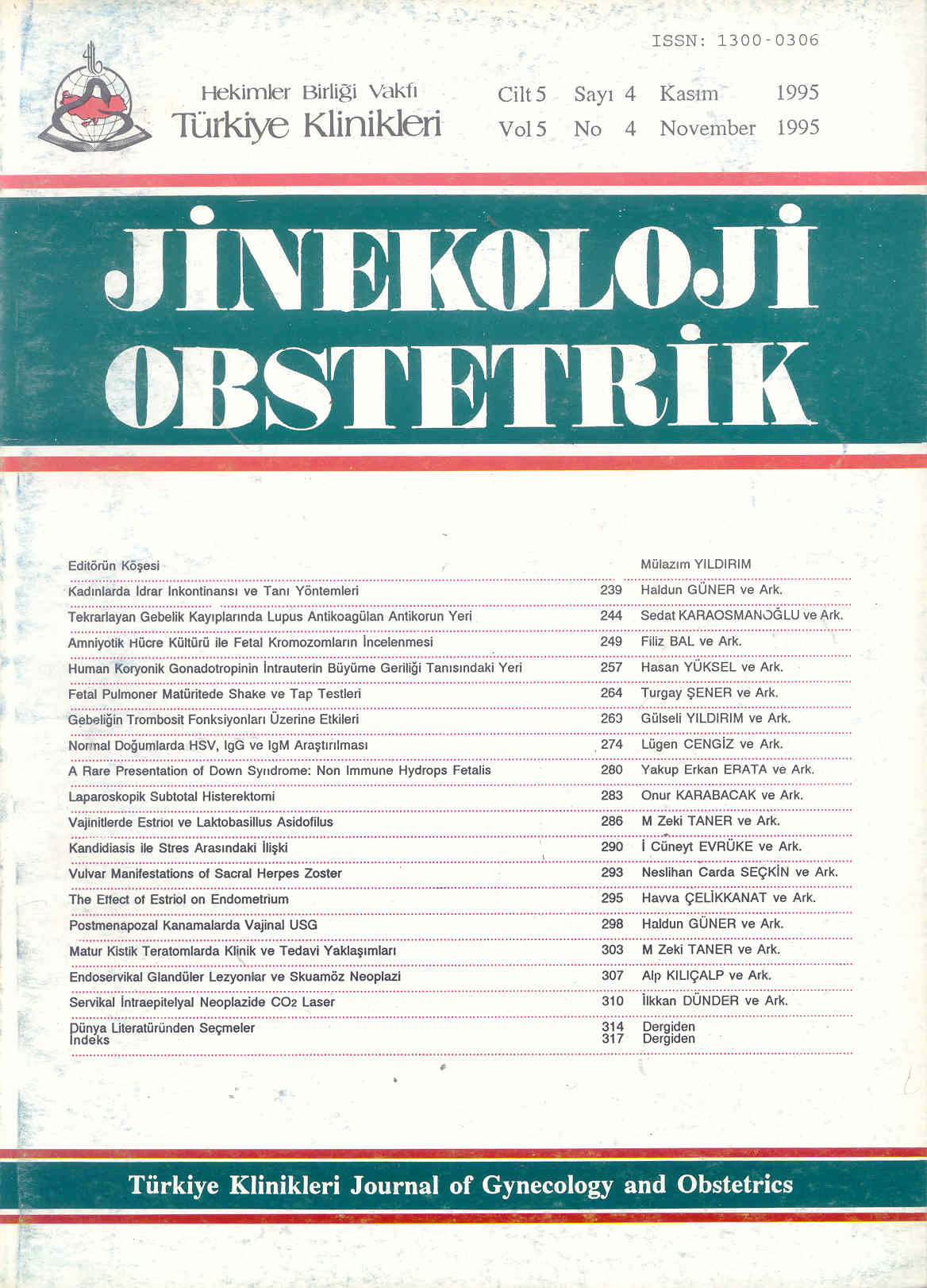Open Access
Peer Reviewed
ARTICLES
3369 Viewed1609 Downloaded
A Rare Presentation of Down Syndrome: Non Immune Hydrops Fetalis
Down Sendromunun Ender Görülen Bir Prezentasyonu: Non-İmmün Hidrops Fetalis
Turkiye Klinikleri J Gynecol Obst. 1995;5(4):280-2
Article Language: TR
Copyright Ⓒ 2025 by Türkiye Klinikleri. This is an open access article under the CC BY-NC-ND license (http://creativecommons.org/licenses/by-nc-nd/4.0/)
ÖZET
Amaç: Kendini hidrops fetalis tablosu ile prezente eden bir Down sendromu olgusunu tartışmak. Çalışmanın Yapıldığı Yer: Dokuz Eylül Üniversitesi Tıp Fakültesi, Kadın Hastalıkları ve Doğum Anabilim Dalı. Materyal ve Metod: 35 yaşında ilk gebeliği olan ve 28. haftada yapılan ultrasonografik tetkikinde non immun hidrops fetalis saptanması nedeniyle kliniğimize refere edilen hasta olgu sunumu olarak hazırlanmıştır. Bulgular: Kliniğimizde yapılan detaylı malformasyon ultrasonunda hidrops fetalise yol açabilecek herhangi spesifik bir anormallik saptanmadı. Kordonsentezle elde edilen fetal kan hücrelerinden yapılan kromozom çalışmasında 47,XY + 21 kromozomal yapı saptanarak Down sendromu tanısı konuldu. Gebelik 29. haftada sonlandırıldı. Otopside tüm sistemler normal olarak değerlendirildi. Sonuç: Birtakım kromozomal anormalliklerin non immün hidrops fetalis ile assosiasyonundan dolayı özellikle hidrops mekanizmasının açıklanamadığı non immün hidrops fetalis olgularında prenatal sitogenetik tetkik yapılmasını öneririz.
Amaç: Kendini hidrops fetalis tablosu ile prezente eden bir Down sendromu olgusunu tartışmak. Çalışmanın Yapıldığı Yer: Dokuz Eylül Üniversitesi Tıp Fakültesi, Kadın Hastalıkları ve Doğum Anabilim Dalı. Materyal ve Metod: 35 yaşında ilk gebeliği olan ve 28. haftada yapılan ultrasonografik tetkikinde non immun hidrops fetalis saptanması nedeniyle kliniğimize refere edilen hasta olgu sunumu olarak hazırlanmıştır. Bulgular: Kliniğimizde yapılan detaylı malformasyon ultrasonunda hidrops fetalise yol açabilecek herhangi spesifik bir anormallik saptanmadı. Kordonsentezle elde edilen fetal kan hücrelerinden yapılan kromozom çalışmasında 47,XY + 21 kromozomal yapı saptanarak Down sendromu tanısı konuldu. Gebelik 29. haftada sonlandırıldı. Otopside tüm sistemler normal olarak değerlendirildi. Sonuç: Birtakım kromozomal anormalliklerin non immün hidrops fetalis ile assosiasyonundan dolayı özellikle hidrops mekanizmasının açıklanamadığı non immün hidrops fetalis olgularında prenatal sitogenetik tetkik yapılmasını öneririz.
ANAHTAR KELİMELER: Down sendromu, hidrops fetalis
ABSTRACT
Objective: To discuss a Down syndrome case which presented itself with severe hydrops fetalis. Institution: Dokuz Eylül University Medicine Faculty, Department of Obstetrics and Gynecology. Material and Methods: 35 year-old women who was referred to our hospital with the diagnosis of hydrops fetalis in her first pregnancy at 28 weeks of gestation is presented as a case report. Findings: At detailed malformation ultrasound in our clinic no any spesific abnormality was detected which might cause to hydrops fetalis. The chromosome analyses of red blood cells of fetus which was obtained by chordosynthesis revealed a 47, XY + 21 karyotype, indicating the diagnosis of Down syndrome. The pregnancy was terminated at 29 weeks of gestation. In autopsy all the systems were evaluated as normal. Conclusion: Because of the association of many chromosomal abnormalities with non immune hydrops we recommend prenatal cytogenetic examination to be performed especially in fetuses with otherwise unexplained causes of non immune hydrops fetalis.
Objective: To discuss a Down syndrome case which presented itself with severe hydrops fetalis. Institution: Dokuz Eylül University Medicine Faculty, Department of Obstetrics and Gynecology. Material and Methods: 35 year-old women who was referred to our hospital with the diagnosis of hydrops fetalis in her first pregnancy at 28 weeks of gestation is presented as a case report. Findings: At detailed malformation ultrasound in our clinic no any spesific abnormality was detected which might cause to hydrops fetalis. The chromosome analyses of red blood cells of fetus which was obtained by chordosynthesis revealed a 47, XY + 21 karyotype, indicating the diagnosis of Down syndrome. The pregnancy was terminated at 29 weeks of gestation. In autopsy all the systems were evaluated as normal. Conclusion: Because of the association of many chromosomal abnormalities with non immune hydrops we recommend prenatal cytogenetic examination to be performed especially in fetuses with otherwise unexplained causes of non immune hydrops fetalis.
MENU
POPULAR ARTICLES
MOST DOWNLOADED ARTICLES





This journal is licensed under a Creative Commons Attribution-NonCommercial-NoDerivatives 4.0 International License.










